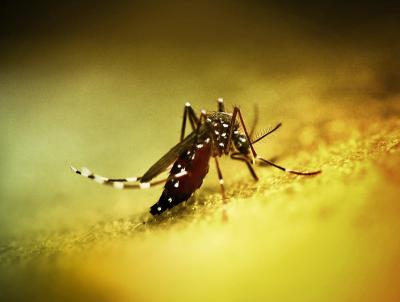NIAID scientists and colleagues are one step closer to developing a safe and effective therapy against alphaviruses with the identification of SKT05, a monoclonal antibody (mAb) derived from macaques vaccinated with virus-like particles (VLPs) representing three encephalitic alphaviruses.
Spread by mosquitos, alphaviruses primarily affect people in one of two ways: causing severe neurological impairment such as encephalitis (brain swelling) or crippling muscle pain similar to arthritis. Western, eastern and Venezuelan equine encephalitis viruses (EEV) are examples of the former, while chikungunya and Ross River viruses are examples of the latter.
Building on studies from the past decade, scientists in NIAID’s Vaccine Research Center and colleagues knew that macaques produce dozens of different protective antibodies when experimentally vaccinated against the EEVs. In a new study published in Cell, the research team identified 109 mAbs in macaques immunized with the experimental western, eastern, and Venezuelan EEV VLP vaccine. All antibodies were individually tested for binding and neutralization against the three EEVs, with the best ones also assessed against arthritogenic alphaviruses not included in the vaccine. Collaborators included scientists from NIAID’s Laboratory of Viral Diseases, USAMRIID’s Virology Division, and Columbia University.
Their work identified SKT05 as the most broadly reactive antibody – remarkably, it also provided protection against both types of alphaviruses, those that cause encephalitis and those that cause arthritic-like disease. High-resolution structural studies further revealed that the way SKT05 binds to alphaviruses could make it resistant to surface changes that can occur in viruses – which means the mAb is likely to have lasting effectiveness.
Further studies are planned to investigate potential clinical development of SKT05. They aim to better define how SKT05 interacts with viruses and whether it can confer protective benefits against additional alphaviruses.
References:
M Sutton et al. Vaccine elicitation and structural basis for antibody protection against alphaviruses. Cell DOI: https://doi.org/10.1016/j.cell.2023.05.019 (2023).
EE Coates, et al. Safety and immunogenicity of a trivalent virus-like particle vaccine against western, eastern, and Venezuelan equine encephalitis viruses: a phase 1, open-label, dose-escalation, randomised clinical trial. Lancet Infectious Diseases (2022).
SY Ko, et al. A virus-like particle vaccine prevents equine encephalitis virus infection in nonhuman primates. Science Translational Medicine (2019).


